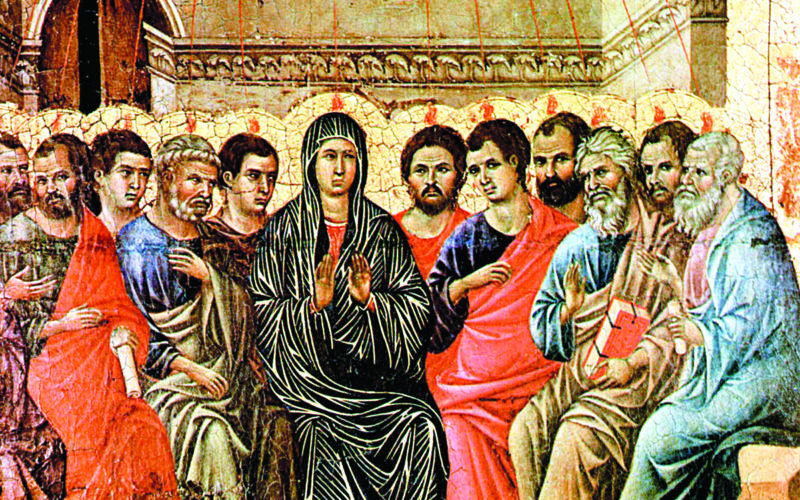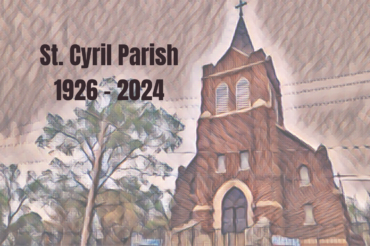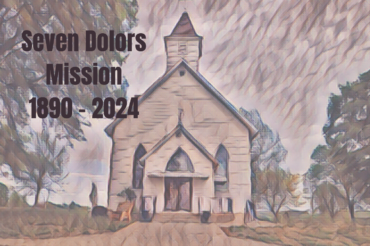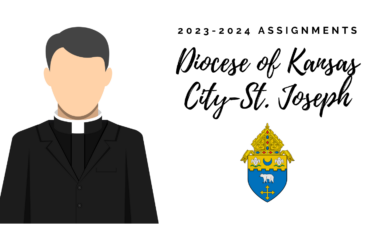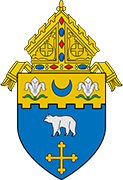The Day of Pentecost
Picture: Pentecost – Duccio di Buoninsegna, 1308-11.
Today we celebrate Pentecost Sunday. The reading from Acts begins, “When the time for Pentecost was fulfilled.” The first Christian Pentecost takes its name from the earlier Jewish celebration.
In Jewish custom, Pentecost was a one-day festival concluding the seven weeks following Passover (Tobit 2:1). It celebrated the harvest offering or first fruits (Exodus 23:16, Numbers 28:26; Deuteronomy 16:9; cf. 1 Corinthians 15:23; James 1:18, Revelation 14:4).
At the time of Jesus, the meaning of Pentecost had been enriched by a new understanding commemorating the giving of the law on Mount Sinai (Exodus 19-20).
Following a somewhat loose chronology of Exodus (19:1), some contemporary Jewish interpreters explained that the law of Moses was given on Mount Sinai fifty days after the Passover. This allowed them to see Pentecost as a time of covenant renewal recalling the events at Sinai.
Like the Exodus event, Pentecost in Acts chapter 2, was accompanied by wind and fire (Exodus 19:18-19; Acts 2:2-3; cf. Hebrews 12:19, 29) and could be seen as a parallel inauguration of a new covenant. St. Augustine points out this connection. Just as there were “50 days” from the Passover in Egypt until the Ten commandments are “written by the finger of God” (Exodus 20:1; 31:18), so now the Spirit comes at Pentecost to write a new law on our hearts (De Spir. litt. 16.28).
Echoing this teaching, Pope St. John Paul II notes, “The message is clear: Pentecost is the new Sinai; the Holy Spirit is the New Covenant; it is the gift of the new law.” Many modern commentators see the Christian event of Pentecost as paralleling Exodus 19-20. A ‘New Law’ is inaugurated by the Holy Spirit through Jesus who is acting like a New Moses.
As promised already in the Old Testament, no longer will the law merely be written on tablets of stone, but, in a new covenant, it will instead be written on our hearts (Jeremiah 31:33). No longer will we have a heart of stone but a heart of flesh. Ezekiel promises, “I will put my spirit within you so that you walk in my statutes, observe my ordinances, and keep them” (Ezekiel 36:27).
In the book of Numbers, Moses expressed a desire that all of God’s people would one day be prophets (Numbers 11:29). This wish came to be treated as a prophecy of a future time when there would be a dramatic outpouring of the Spirit.
With the coming of the Messiah there was an expectation that the ‘Spirit of prophecy’ would be poured out on all flesh (Joel 2:28-32; Jeremiah 31:34; Isaiah 32:15; 44:3; Ezekiel 39:29). This lavish out pouring of the Spirit would be brought about through a new prophet like Moses (Deuteronomy 18:15) or a Messiah King (Isaiah 11:1-9; 61).
A Pentecost, the Apostle Peter uses the promised outpouring of the Spirit in Joel 2:28-32 to interpret the events in Acts 2:16-21. Now that Jesus has suffered, died, been resurrected, and ascended into heaven, the promised Spirit will be poured out on “all flesh.” With keen insight, St. Thomas Aquinas says that the Holy Spirit himself is the New Covenant, producing supernatural love in us, and the fullness of the law (Comment. in 2 Cor. 3: 6).
As St. John says, “As for you, the anointing that you received from him remains in you, so that you do not need anyone to teach you. But his anointing teaches you about everything and is true and not false; just as it taught you, remain in him.” (1 John 2:27)
Jesus’ promise to his disciples at the Last Supper is now fulfilled: “The Counsellor, the Holy Spirit, whom the Father will send in my name, he will teach you all things, and bring to your remembrance all that I have said to you” (John 14:26). The promise of the Holy Spirit is about our own daily intimate union with God through the Spirit. It is also a specific and unique empowerment for mission in the world (Acts 1:8). This is Pentecost. This is the New Covenant.
Earlier in John’s Gospel Jesus promised, “in my Father’s house are many dwelling places” (John 14:2) using the same Greek word Jesus says, “we will come to them and make our home with them” (John 14:23).
In the Jewish world, the place where God dwelt among his people was in sanctuary or the holy of holies in the Temple. The Temple was God’s home. Earlier in John’s Gospel Jesus says, “Destroy this temple, and in three days I will raise it up” (John 2:19). Jesus now equates the Temple and God’s home to his own body.
God desires to make his dwelling place in our hearts. Through the indwelling of the Holy Spirit, we have communion with Christ’s own body. St Paul tells us that each one of us is now the Temple of the Holy Spirit (1 Corinthians 6:19). He also reminds us, “God proves his love for us in that while we were still sinners Christ died for us.” Each and every one of us is wanted by God. He loves us first, just as we are. Yet there is something we need to do. We need to accept his forgiveness and to let our life be transformed by the Holy Spirit’s presence. Each one of us must receive ‘the spirit of sonship’ allowing the Spirit himself to bear witness with our spirit that ‘we are children of God’ (Romans 8:15-16).
The new law begins with interior conversion in our hearts. Lord come and make your home in my heart this day. Take away my fears and let me find your peace in my heart.
Deacon Scott McKellar is Pastoral Associate at St. Therese Parish, North.

